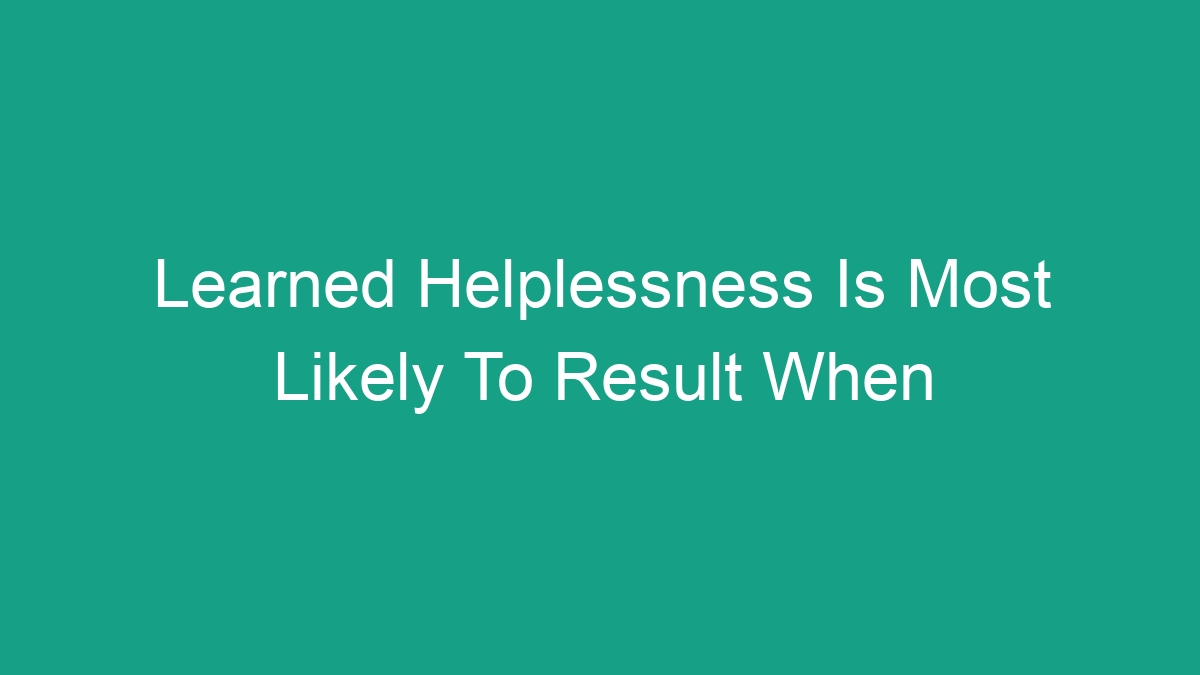
Learned helplessness is a psychological phenomenon that occurs when an individual feels powerless to change or control their situation, even when they have the ability to do so. This feeling of helplessness often leads to a lack of motivation, lowered self-esteem, and even depression. Understanding the causes and effects of learned helplessness is crucial in preventing its negative impact on individuals’ mental well-being.
What Is Learned Helplessness?
Learned helplessness was first studied by psychologists Martin Seligman and Steven Maier in the late 1960s. In their experiments, they observed that dogs who were subjected to unavoidable electric shocks in one part of a cage would later fail to escape from shocks in another part of the cage, even when escape was possible. This led to the theory of learned helplessness, which suggests that individuals who experience repeated negative events over which they have no control will eventually come to believe that they are unable to change or improve their circumstances.
How Does Learned Helplessness Develop?
Learned helplessness is most likely to result when certain conditions are present. These conditions can include:
- Uncontrollable Situations: When individuals are repeatedly exposed to situations where they have no control over the outcome, they may develop learned helplessness. This could be in the form of abusive relationships, toxic work environments, or ongoing health issues.
- Negative Reinforcement: If individuals are consistently met with negative consequences, such as punishment or criticism, regardless of their efforts, they may begin to believe that their actions have no impact on the outcome.
- Attribution Style: Individuals who tend to attribute negative events to internal, stable, and global factors (e.g., “I’m not good enough,” “I always fail,” “Everything in my life is a mess”) are more susceptible to developing learned helplessness.
- Early Experiences: Childhood experiences, such as neglect, trauma, or authoritarian parenting, can also contribute to the development of learned helplessness later in life.
Effects of Learned Helplessness
The effects of learned helplessness can be far-reaching and detrimental to an individual’s mental health and overall well-being. Some of the common effects include:
- Depression: Learned helplessness has been linked to the development and maintenance of depression. When individuals believe that their actions have no impact on the outcome of their lives, they may experience feelings of hopelessness and helplessness, which are hallmark symptoms of depression.
- Lowered Self-Esteem: Continuously experiencing failure and lack of control can lead to a diminished sense of self-worth and confidence. Individuals may begin to question their abilities and worth, leading to a negative impact on their self-esteem.
- Reduced Motivation: When individuals feel that their efforts will not lead to positive outcomes, they may become unmotivated to try or put in the effort. This can have consequences in various areas of life, including work, relationships, and personal development.
- Impact on Physical Health: Research has suggested that learned helplessness may also have negative effects on physical health, including weakened immune functioning and increased susceptibility to illness.
How to Overcome Learned Helplessness
While learned helplessness can have severe consequences, it is not a permanent state. Individuals can overcome learned helplessness through various strategies and interventions, including:
- Cognitive-Behavioral Therapy (CBT): CBT is an evidence-based approach that helps individuals identify and challenge negative thought patterns and beliefs. By reframing their perceptions of control and agency, individuals can learn to overcome learned helplessness.
- Empowerment and Skill-Building: Providing individuals with opportunities to learn new skills, make choices, and experience success can be instrumental in breaking the cycle of learned helplessness.
- Social Support: Surrounding oneself with supportive and positive influences can counteract the effects of learned helplessness. Social support can provide encouragement, perspective, and motivation to initiate change.
- Mindfulness and Resilience-Building Practices: Mindfulness meditation and resilience-building techniques can help individuals develop a greater sense of inner strength and coping mechanisms to navigate challenges and setbacks.
FAQs
What are some common signs of learned helplessness?
Common signs of learned helplessness may include a lack of motivation, persistent negative self-talk, feelings of hopelessness, and reluctance to try new activities or take on challenges.
Can learned helplessness be unlearned?
Yes, learned helplessness can be unlearned through therapy, self-awareness, and the implementation of strategies that promote empowerment and agency.
Are there specific populations that are more susceptible to learned helplessness?
While learned helplessness can impact individuals from all walks of life, those who have experienced trauma, abuse, or chronic stress may be more susceptible to its effects.
How can caregivers and educators prevent learned helplessness in children?
Caregivers and educators can encourage resilience and agency in children by promoting a growth mindset, providing opportunities for success and autonomy, and offering support and guidance during challenging times.
What are some resources for individuals struggling with learned helplessness?
Seeking support from mental health professionals, joining support groups, and engaging in self-help activities such as journaling, practicing gratitude, and engaging in activities that bring joy and fulfillment can be valuable resources for individuals struggling with learned helplessness.
Ultimately, learned helplessness is a complex psychological phenomenon that can have profound effects on individuals’ lives. By understanding its causes, effects, and strategies for overcoming it, individuals can take proactive steps toward reclaiming a sense of control and empowerment in their lives.



